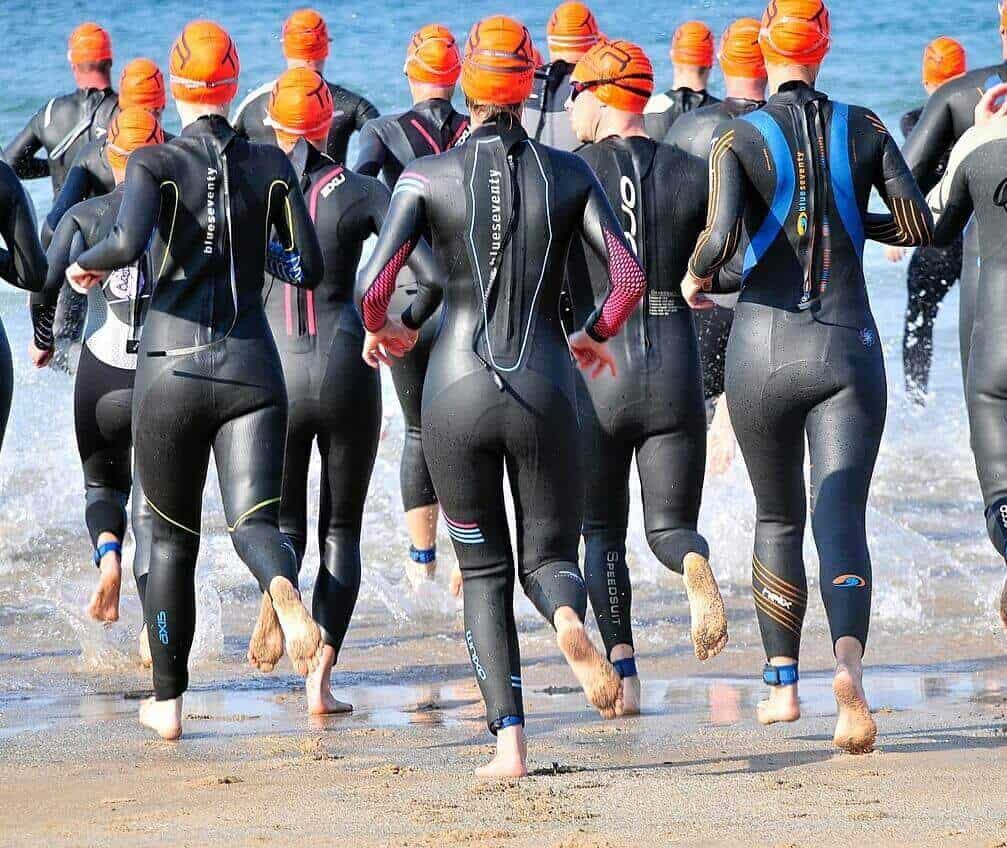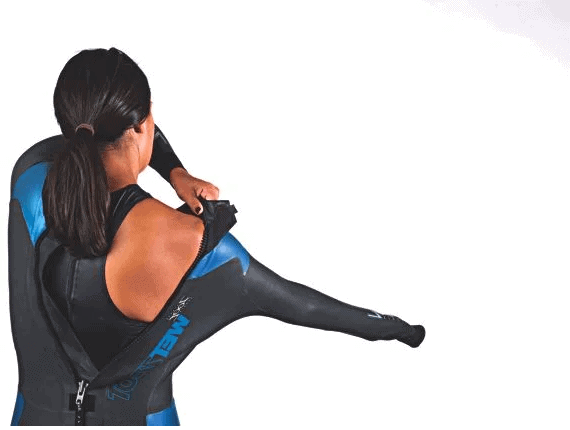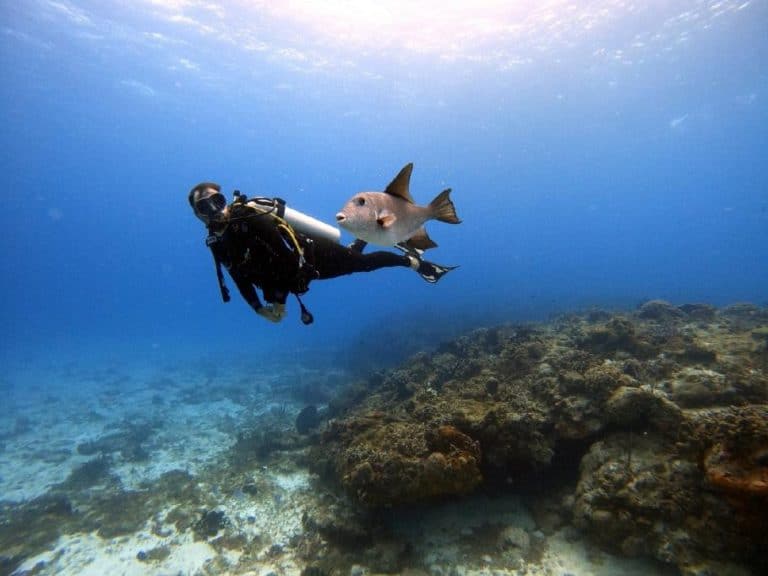Are Wetsuits Waterproof
Wetsuits are widely used in many water sports but most importantly in scuba diving. If you’ve not yet been asked this question “are wetsuits waterproof” then it’s probably on the way. 🙂
Wetsuits are not waterproof. Water can get in through the neck, wrist, ankles, seams, or zippers. The neoprene material used to make wetsuits is in fact waterproof meaning water doesn’t seep directly through the material onto your skin; it finds its way through the points mentioned earlier.
In other water sports such as surfing, non-surfers may wonder if this black gear you wear is waterproof or whether it keeps you warm.
The same is true in scuba diving, many non-divers are also curious to find out whether the wetsuit is waterproof and if it keeps you dry when diving.
In this article, we’ll dive deeper into whether wetsuits are waterproof, if they keep you dry, warm and so much more.
Just keep reading to learn more.
READ MORE: Can You Machine Wash Wetsuits
Are Scuba Diving Suits Waterproof?
Scuba divers a probably the majority of wetsuit wearers in all water sports. Just like any other wetsuit made from neoprene rubber, scuba diving suits are not waterproof.
Finding a wetsuit that fits well helps reduce the amount of water seeping into it through zippers, the neck region, ankles, seams, or the wrists.
A loose-fitting wetsuit will allow a lot of water making it difficult to move around when driving. A well-fitted suit may allow a thin layer of water in but this doesn’t interfere with your movements.
In addition, when there is a lot of water in the wetsuit, it will take the body a lot of energy and time to warm it up ensuring you stay warm. A thin layer of water is usually heated up quickly and since the wetsuit is a good insulator, the heat trapped doesn’t escape.
Looking at a loose wetsuit allowing a huge stream of water, first, the body uses a lot of energy trying to heat it up leaving you exhausted. This also increases the risk of going into hypothermia.
Since the water comes in and flows out easily in a loose or baggy wetsuit, it would be very difficult for the body to keep you warm as all the energy is used up trying to warm up this water.
It’s important to get a well-fitting suit, the thin layer of water getting in remains trapped there during the dive, and once heated up the body and wetsuit can easily keep you warm.
When putting on the wetsuit, divers try as much as possible to reduce any loose ends around the neck area to keep the water out. In the neck area, the zipper can leave a huge opening allowing in a lot of water.

How Wetsuits Work
Wetsuits are designed to keep dives warm and also allow easy movements. The neoprene material used is basically synthetic rubber with thousands of tiny air pockets which make the suits good insulators.
These suits aren’t porous meaning water doesn’t seep through the material or soak up like a sponge or any other fabric would.
In scuba diving, the whole body is submerged in the water allowing a thin layer of water through the small openings on zippers, seams, and other points mentioned above.
When used in other water sports such as surfing little water gets in since the body isn’t submerged in water. Surfers get most water into their wetsuits when they fall into the water or from big waves.
A wetsuit warms up pretty fast and it is a good insulator so all the heat will be trapped and keep warming up your body. You also sweat easily with the sweat dripping down your body.
The sweat can be trapped within the wet suit unless it’s loosely fitting or it will slowly flow out of the wetsuit.
Do Wetsuits Keep You Warm Out Of the Water
By now we all know that wetsuits are designed to trap as much heat as possible to help keep the body warm while in the water. Water draws heat away from the body at a higher rate compared to air raising the risk of hypothermia.
Wetsuits will keep you warm as you dive and prevent the loss of heat generated by the body. This not only keeps your body warm but also reduces the amount of energy spent generating heat.
Does this same mechanism apply outside of the water; do wetsuits keep you warm out of the water?
Yes, a wetsuit will keep you warm even when outside the water. The neoprene material still traps heat in the air pockets that keep you warm.
Many divers usually get off the wetsuit as soon as they surface from diving because the suit can make you sweat very easily. It keeps the heat trapped and insulated all the time.
Some will take it off up to the waist if they didn’t have something underneath or if their changing clothes are on the boat. This generally helps reduce the heat trapped around the body and reduce sweating.
Walking around in a sweaty suit can be quite uncomfortable and feels sticky to your body.
In addition, leaving the wetsuit on for long when out of the water will allow the thin layer of water trapped to flow out through the ankles making it very difficult to take off the wetsuit.
Do You Stay Dry Under A Wetsuit?

No, a thin layer of water can get into the wetsuit making your body and swimsuits worn underneath wet.
There is no guarantee that you will remain dry when wearing a wetsuit. Even with the perfect fitted suits water can still find its way into the wetsuit.
As long as your body is fully submerged in water, it will find a way in. All wetsuits have zippers and seams which can allow water in.
The good news is there are diving suits designed to keep you dry during the dive. These are known as dry suits.
Unfortunately, these are mostly used for professional deep diving and not so much for recreational diving.
The material is waterproof and very loose making it difficult to move around in especially for beginners. The loose fit in dry suits can impair buoyancy for first-time divers and beginners. The suits are quite expensive as well.
Drysuits are commonly used for deep diving where the water gets very cold when diving in cold regions, and also used in kayaking.
Wetsuit manufacturing continues to advance over the years to provide divers with the “perfect” gear and ensure diving is comfortable and enjoyable.
There are waterproof wetsuits available in the market. The price is slightly higher compared to a standard wetsuit and some divers have expressed that water still leaks through the zippers in some brands. It also gets uncomfortable diving in these suits for long periods.
Final thoughts
Wetsuits are not waterproof. As discussed above as long as the body is submerged in water then it can find its way into the wetsuit.
Investing in a dry suit is a possibility if you live in very cold regions, and spend a lot of time diving or diving very deep. However, this wouldn’t be worth it for beginners since drysuits can be challenging for buoyancy.
A wetsuit is designed to keep you warm and the perfect snug allows easy movement in the water. For recreational diving, there is no need to worry about staying dry.






